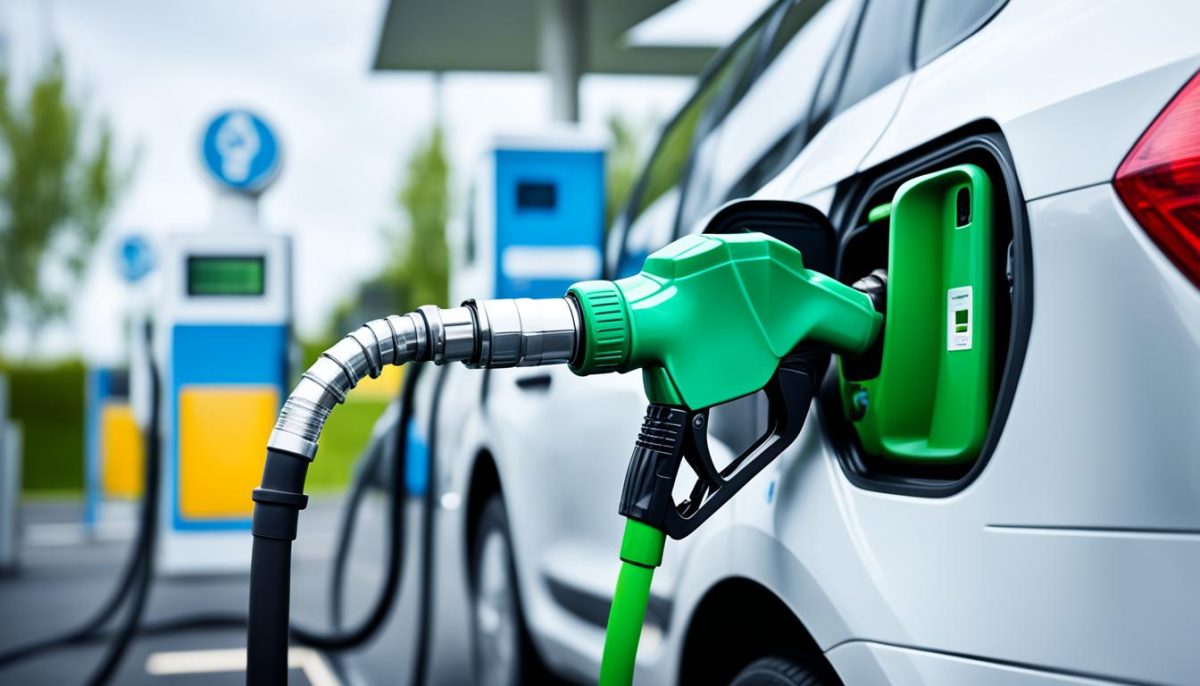Welcome to our exploration of alternative fuels for cars, where we will dive into the world of greener and more sustainable transportation options. In this article, we will discuss two major alternatives: electric power and biofuels. Let’s discover how these alternatives can help us reduce carbon emissions and move towards a more environmentally friendly future.
First, we’ll take a closer look at electric power as an alternative fuel option. Electric vehicles (EVs) have gained tremendous popularity in recent years, thanks to their zero-emission capabilities. We’ll explore the benefits of EVs, including their lower carbon footprint and quiet operation. Additionally, we’ll discuss the growing availability of charging infrastructure and the use of renewable energy sources to power EVs.
Next, we’ll shift our focus to biofuels. Bioethanol and biodiesel are promising alternatives that can be produced from renewable resources. We’ll delve into the production processes of these biofuels and highlight the importance of sustainable farming practices in their creation. Furthermore, we’ll touch upon the challenges and advancements in integrating biofuels into existing vehicles and infrastructure.
Lastly, we’ll explore other promising alternative fuels, such as hydrogen fuel cells, natural gas, and propane. These fuels have the potential to revolutionize the industry and offer cleaner options for transportation. We’ll discuss their benefits, challenges, and current developments in harnessing their potential.
Throughout this article, we aim to provide you with an in-depth understanding of the various alternative fuels available for cars. So, join us on this journey as we navigate the world of greener mobility. Let’s pave the way towards a sustainable and environmentally conscious future.
Electric Power as an Alternative Fuel Option
Electric power has emerged as a prominent and environmentally friendly alternative fuel option for cars. With the rapid advancement of electric vehicle (EV) technology, the automotive industry has witnessed a significant rise in the adoption of electric vehicles.
One of the key benefits of electric vehicles is their superior eco-friendliness. Unlike traditional gasoline-powered vehicles, EVs produce zero tailpipe emissions, reducing air pollution and contributing to cleaner air quality in our cities and communities. The shift to electric vehicles plays a crucial role in combating the effects of climate change and reducing carbon emissions.
However, the widespread adoption of electric vehicles relies on the availability of a robust charging infrastructure. Charging infrastructure refers to the network of charging stations where EV owners can recharge their vehicles. The establishment of a comprehensive and accessible charging infrastructure is essential to alleviate range anxiety among EV users and ensure the seamless integration of electric vehicles into our daily lives.
Fortunately, there has been a significant expansion in charging infrastructure worldwide. Governments and private organizations have been investing in the development of public charging stations, making it easier for EV owners to charge their vehicles when away from home. In addition, various institutions are deploying charging stations in apartment complexes, workplaces, and public parking areas, enhancing the convenience and accessibility of EV charging.
Moreover, to make electric vehicles even more sustainable, renewable energy sources are being harnessed to power these vehicles. The integration of renewable energy, such as solar and wind power, into the charging process ensures that electric vehicles are powered by clean and renewable sources. This further reduces the carbon footprint associated with transportation and supports the transition towards a greener and more sustainable future.
As the demand for electric vehicles continues to grow, so does the need for innovative technologies and advancements in battery technology. These advancements aim to increase the driving range of EVs, improve charging efficiency, and reduce charging times. Researchers and manufacturers are constantly pushing boundaries to develop cutting-edge battery technologies that address these challenges and make electric vehicles a more practical and convenient choice for consumers.
Electric power is transforming the way we think about transportation. With zero tailpipe emissions, a growing charging infrastructure, and the integration of renewable energy sources, electric vehicles are paving the way towards a cleaner and more sustainable future.
Stay tuned for the following sections as we explore other alternative fuel options, such as biofuels, hydrogen fuel cells, natural gas, and propane, which offer unique solutions to reduce our reliance on fossil fuels and contribute to a greener planet.
Biofuels as an Alternative Fuel Option
As the push for sustainable transportation gains momentum, biofuels have emerged as a promising alternative to traditional gasoline and diesel. Biofuels, such as **bioethanol** and **biodiesel**, are derived from organic sources, making them a cleaner and more environmentally friendly option for cars.
One of the key advantages of biofuels is their production process. **Bioethanol**, for instance, is primarily produced by fermenting sugars from crops such as corn, sugarcane, or switchgrass. This renewable energy source can be blended with gasoline to power vehicles, reducing greenhouse gas emissions and dependence on fossil fuels. Similarly, **biodiesel** is obtained from renewable sources such as vegetable oils or animal fats through a chemical process called transesterification, making it a viable alternative fuel for diesel engines.

However, the availability and viability of biofuels heavily rely on sustainable farming practices. Sustainable farming ensures that the crops used for biofuel production are cultivated in an environmentally friendly manner, with minimal impact on ecosystems and water resources. By implementing sustainable farming techniques, such as crop rotation, precision agriculture, and water conservation practices, we can ensure the long-term sustainability of biofuels as a viable alternative fuel option.
Integrating biofuels into existing vehicles and infrastructure poses certain challenges. For instance, not all vehicles are compatible with high concentrations of biofuels, and modifications or retrofitting may be required. Additionally, the availability of biofuel refueling stations is still limited compared to traditional gasoline stations. However, advancements in technology and governmental support are driving the development of more biofuel-friendly vehicles and expanding the infrastructure needed for widespread adoption.
In conclusion, biofuels, such as **bioethanol** and **biodiesel**, offer a cleaner and more sustainable alternative to conventional gasoline and diesel. By embracing sustainable farming practices and investing in further research and development, we can unlock the full potential of biofuels as a key player in the transition towards a greener future for transportation.
Other Promising Alternative Fuels for Cars
Besides electric power and biofuels, there are other exciting alternatives for fueling cars sustainably. Let’s take a closer look at the potential of hydrogen fuel cells, natural gas, and propane and their role in revolutionizing the automotive industry.
Hydrogen fuel cells have emerged as a promising clean energy solution. These cells convert hydrogen and oxygen into electricity, emitting only water vapor as a byproduct. With zero greenhouse gas emissions and a quick refueling time, hydrogen fuel cells offer a compelling alternative to conventional gasoline-powered vehicles.
As for natural gas, it presents a cleaner-burning option compared to gasoline or diesel. Composed mainly of methane, natural gas releases fewer pollutants and has a lower carbon footprint. Many car manufacturers have embraced natural gas as a viable alternative, offering compressed natural gas (CNG) vehicles that can run on this abundant, low-cost fuel source.
Propane, also known as liquefied petroleum gas (LPG), has gained popularity as a cleaner and more accessible alternative fuel. Propane-powered vehicles produce significantly fewer emissions than gasoline-powered ones, reducing levels of harmful pollutants and greenhouse gases. As an added benefit, propane is widely available and can be easily stored and transported, making it a convenient fuel option.
By exploring these alternative fuel options like hydrogen fuel cells, natural gas, and propane, we uncover a potential future for cleaner transportation. Continued advancements in technology, infrastructure, and adoption will contribute to a more sustainable and eco-friendly automotive industry.

